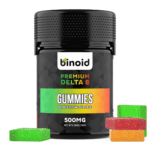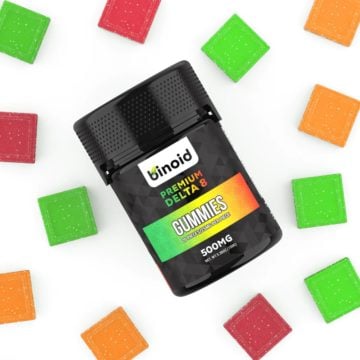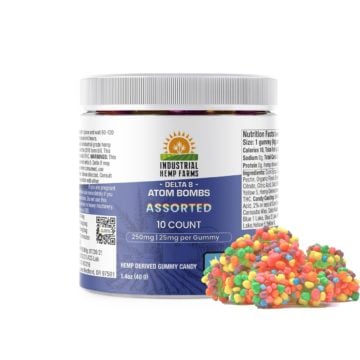
How Might Delta-8-THC Affect Someone's Mood
In recent years, Delta-8-THC has emerged as a topic of interest within the cannabis community. This lesser-known cannabinoid, often derived from hemp, has gained popularity for its potential mood-altering effects. The rise in availability of Delta-8-THC products, including Delta 8 gummies and vape cartridges, has sparked curiosity about its impact on mental health and well-being. In this article, we will delve into the world of Delta-8-THC and explore how it might influence someone’s mood.
Understanding Delta-8-THC and its potential effects on mood is essential in a society where cannabis products, both medical and recreational, are increasingly accessible. While Delta-9-THC, the more famous cousin of Delta-8, has long been associated with psychoactive effects and mental health implications, we aim to shed light on this emerging cannabinoid and its unique properties. Moreover, as the landscape of cannabis legality continues to evolve, responsible use and informed decision-making are paramount.
This post is intended as information and for general knowledge only. It is not a substitute for medical advice, diagnosis, or treatment. It is recommended that you talk to a healthcare professional about this before introducing cannabinoids into your daily routine (especially if you have been diagnosed with any medical conditions or are under any medication). It is not recommended to drive or operate any machinery when using cannabis- or hemp-derived products. Use responsibly!
What is Delta-8-THC?
Delta-8-THC, short for Delta-8 Tetrahydrocannabinol, is a cannabinoid found in the cannabis plant. Its chemical structure closely resembles that of Delta-9-THC, the compound responsible for the characteristic “high” associated with marijuana. However, Delta-8-THC is typically derived from hemp, which makes its legal status more favorable in many regions.
One key distinction between Delta-8-THC and its more famous counterpart, Delta-9-THC, is their psychoactive potency. Delta-8-THC is known for being less potent, which may appeal to individuals seeking a milder cannabis experience. This difference in potency can be an essential factor in understanding how Delta-8-THC might affect someone’s mood.
The Endocannabinoid System (ECS) and Mood Regulation
To comprehend how Delta-8-THC may influence mood, it’s crucial to delve into the Endocannabinoid System (ECS). The ECS is a complex network of receptors and neurotransmitters found throughout the body, involved in maintaining homeostasis, or physiological balance.
Cannabinoids, including Delta-8-THC, interact with the ECS by binding to cannabinoid receptors, primarily CB1 and CB2. These receptors play a significant role in mood regulation, among other functions. When Delta-8-THC interacts with the ECS, it has the potential to impact one’s emotional state.
Potential Positive Effects on Mood

Many users of Delta-8-THC have reported positive mood-related effects, although individual experiences can vary widely. Some potential positive effects include relaxation and stress reduction, as well as feelings of euphoria and elevated mood. Research into these effects is ongoing but suggests that Delta-8-THC may provide a unique avenue for improving mood and overall well-being.
It’s essential to emphasize responsible consumption practices when considering Delta-8-THC for mood enhancement. Dosage considerations, as well as understanding one’s own tolerance, are vital aspects of achieving the desired mood-related effects while minimizing potential adverse effects.
Potential Negative Effects on Mood
While Delta-8-THC may offer mood-enhancing benefits for some, it’s crucial to acknowledge potential negative effects as well. Excessive consumption of Delta-8-THC can lead to anxiety and paranoia, as well as mood swings and irritability. These adverse effects can be particularly pronounced in individuals with pre-existing mental health conditions.
Individual differences play a significant role in how Delta-8-THC affects mood. Factors such as dosage, frequency of use, and an individual’s mental state at the time of consumption can all influence the outcome. Responsible use and moderation are key to mitigating these potential negative effects.
Delta-8-THC and Anxiety
Anxiety is a prominent concern when it comes to cannabis products, including Delta-8-THC. Some research suggests that Delta-8-THC may have potential as an anxiety management tool. However, findings are mixed, and individual responses vary.
For those considering Delta-8-THC for anxiety relief, it’s essential to follow dosage recommendations and exercise caution, especially if you have an anxiety disorder. Consulting with a healthcare professional is advisable to ensure safe and effective use.
Mood Enhancement vs Dependence and Withdrawal
Mood enhancement through Delta-8-THC can be a double-edged sword. While it may provide short-term relief from stress or low mood, there is a potential for dependence and withdrawal symptoms with frequent and heavy use. Signs of dependence can include an increased tolerance to Delta-8-THC, cravings, and difficulty reducing or quitting its use.
Avoiding dependence involves setting clear boundaries and strategies for responsible consumption. If you find yourself using Delta-8-THC to regulate your mood excessively, it’s crucial to seek support and consider alternative methods for achieving emotional balance.
Legal and Safety Considerations
The legal status of Delta-8-THC varies significantly depending on your location. In the United States, for example, its legality is subject to state laws, resulting in a patchwork of regulations. International legality also differs from country to country.
Safety considerations are paramount when using Delta-8-THC products. Ensuring product quality and purity is crucial to minimize the risk of adverse events. Contaminants in Delta-8-THC products can pose serious health risks, emphasizing the importance of sourcing products from reputable vendors.
Furthermore, if you are taking medications for mental health or other conditions, it is crucial to consult with a healthcare professional before using Delta-8-THC, as interactions can occur.
Personal Experiences and Testimonials
To provide a well-rounded perspective on Delta-8-THC’s effects on mood, it’s essential to share personal experiences and testimonials from individuals who have used it. These real-life accounts offer valuable insights into the variability of responses and the subjectivity of mood-related effects. It’s worth noting that what works for one person may not work the same way foranother.
By considering the experiences of others alongside your own research, you can make more informed decisions about using Delta-8-THC to potentially enhance your mood.
Conclusion
In conclusion, Delta-8-THC has garnered attention for its potential effects on mood. Understanding its properties, the intricacies of the Endocannabinoid System, and the factors that influence its impact on mood is crucial for responsible use. While Delta-8-THC may offer relaxation, euphoria, and mood enhancement to some, it also carries the risk of adverse effects, including anxiety and dependence.















